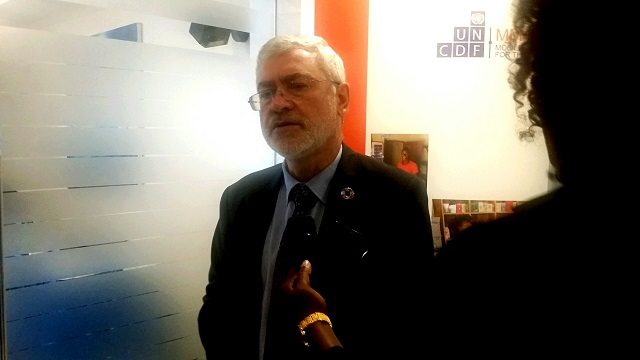
Kampala, Uganda | JULIUS BUSINGE | Experts in agriculture and information technology want farming communities to be supported through digital tools such as phones as a mechanism of encouraging them not to leave agriculture.
The tools such as phones are popularly being used as avenues to facilitate communication and payments to farmers in rural areas which are not well served by financial institutions.
“Such tools are key in fighting poverty, ensuring food security and creating value for the economy,” Dmitry Pozhidaev, the regional technical advisor in charge of local development finance at UN Capital Development Fund (UNCDF)– Uganda Office said.
Pozhidaev was speaking at a half day workshop titled ‘Learnings from the Field: Implementing Digital Bulk Payments in Agricultural Value Chains in Uganda’ held at Golden Tulip Hotel in Kampala on Oct.16.
Organised by UNCDF, the workshop brought together over 50 participants from agriculture, banking, telecommunication and development partners fields to discuss the role of UNCDF and its partners in promoting the agriculture sector.
Since 2014, UNCDF has been stimulating private sector engagement in rural areas of Uganda through digital bulk payment projects across five agricultural value chains – coffee, dairy, maize, seed oil and tea.
Core to this effort has been a drive to digitize payments within agriculture.
According to Pozhidaev, digitizing payments within agricultural value chains offers a compelling opportunity to improve the financial inclusion of smallholder farmers as well as creates efficiencies for agribusinesses and other stakeholders.
He added that for the smallholder farmers who operate within these value chains, digitisation offers an important opportunity to be formally financially included.
The 2016 figures show that 90% of Ugandan smallholder farmers do not have an account at a financial institution, and 71% have never used mobile money.
UNCDF’s partnership with telecom companies such as MTN and Airtel Uganda, staff and transporters of Kyagalanyi Coffee Limited (KCL) have moved to mobile money payments.
UNCDF figures show as of September 2018, 3,614 farmers of KCL had voluntarily received payments digitally.
And that in the first six months of the project, KCL observed a 30% increase in coffee purchases due to supply-chain efficiencies with farmers having quicker and more transparent information on prices, delivery time to the collection points and faster payments.
In addition, the average revenue per user for telecom companies had improved in the areas of Mt. Elgon in Eastern Uganda, Rwenzori Mountains in Western Uganda, some parts of Northern Uganda and other areas where UNCDF engaged a total of 175,533 farmers since 2014.
Ali Balunywa, the sales and distribution director at Airtel Uganda said that investing in the areas where UNCDF worked because it gave them an opportunity to expand their operations and increase its relationship with clients and agents of mobile money and others.
He said that Airtel has 100% coverage of 3G network in all parts of the country and that it would continue innovating to support farming communities in rural Uganda.
Going forward, Pozhidaev said implementing policies that support agriculture was paramount given that the sector contributes 25% to Uganda’s GDP and employs over 70% of the total population estimated at slightly over 40 million people.
 The Independent Uganda: You get the Truth we Pay the Price
The Independent Uganda: You get the Truth we Pay the Price





